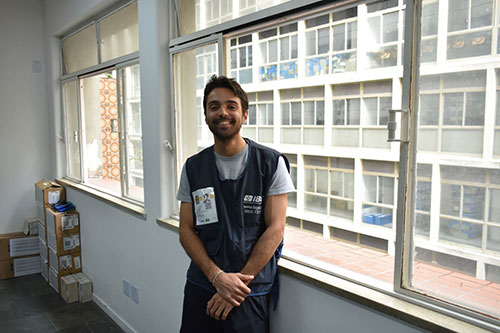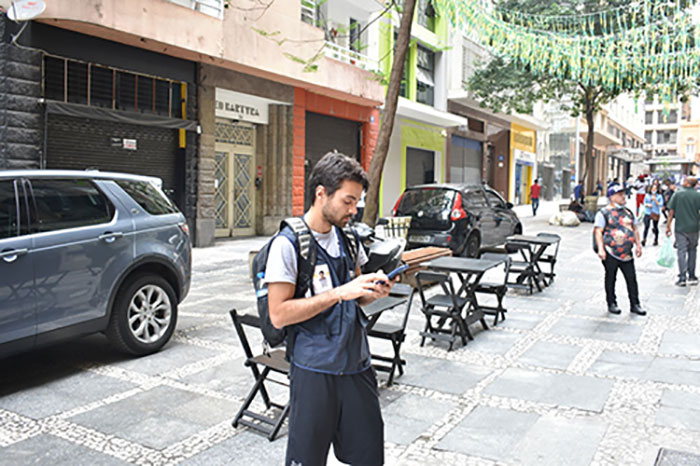"My motivation is providing data to Brazilians", Wesley Mendonça, enumerator in SP
November 28, 2022 11h02 | Last Updated: December 07, 2022 15h24
Working in the 2022 Census since the beginning of the data collection, 24-year old Wesley Mendonça stands out in this edition due to his extraordinary productivity. The enumerator, who carries out 30 interviews per day, on average, works in the central region of São Paulo, a place known for hundreds of popular stores and famous tourist spots, like: Municipal Theater, Chá Overpass and Mário de Andrade Library
Holding a degree in Social Sciences, he told that he always wanted to work with surveys in the field and that the work has helped him to live new experiences. “When I was still in college, I always wanted to work in the field. Therefore, I looked for internships in some offices of data analysis, but I never managed to go to the field. In 2019, I noticed the Census tender on the Internet, I asked around about the importance of this work and I noticed that this experience might allow me to do what I really wanted - work in the streets and know better the reality of the place where I live. I follow up the cultural and artistic scene, so I always loved to talk. When I leave to collect data, I not only want to complete the questionnaire, but also to know a little bit more about the people´s lives. I enumerated Bela Cintra Street, in the neighborhood of Bela Vista, which is a fancy region, and I also did Vila Buarque, where residents have a lower income. It was possible to notice many social differences: the time I took to complete the questionnaires, the talks I had…the contrasts were blatant. In the richer neighborhoods, I noticed that the persons answered the questionnaire as an obligation. In modest places, the persons not only answered the questions, but also attempted to expose a little bit more of their lives. Although the Census work is temporary, enumerators manage to develop some bonds and build a very nice network. I made friends in the data collection stations, talked a lot about the situations I lived in the field, shared experiences. Everything was very enriching.

Wesley Mendonça, 24, works in the central region of São Paulo - one of the most critical points to carry out the 2022 Census data collection
Mendonça already represents the IBGE as an enumerator for 4 months. Although he got a formal job last October, he continues to work because the admires the social role of the survey. “I applied in April and began on August 1st. I remember that when I arrived at the data collection station around 8 AM on the first day, I began to create some jingles about the Census to keep myself motivated. Since then, I rested only for 4 days. In October, I got a job as cultural producer at the Monteiro Lobato Library. As I manage to reconcile the two jobs, I continue to work in the Census. Besides benefiting in financial terms, this is a service that I like to do.”
The work in the field provides several unexpected moments and Mendonça insisted on highlighting some surprises he lived during the data collection. “Once I met a met a friend of a teacher I had in the college where I studied and we managed to talk for more than a hour. I had another nice moment in Vila Buarque, when I needed to get the coordinates in a building. It was not easy to enter the building, but after a long conversation with the administrator, accountant and even the lawyer of the condominium, they allowed me to come on in. During the visit, the janitor followed me until the lightning rod of the building, some 100 m high, which provided a very nice view of the entire city. Then I thought: ‘Gee, I came to work in the Census and I managed to be in an adventure like this (laughs).’”

”In 2019, I saw something about the Census tender on the Internet, I managed to know a little bit more about the importance of this work and I noticed that this experience might allow me to do what I really wanted - to work in the streets and to know better the reality of the place where I live,” stated the young man in an interview to the SDI/SES-SP
However, the young man also highlight some setbacks he experienced in the beginning of his work. “In the very first days I had difficulties to access some buildings. It not only happened to me, but also with hundreds of enumerators. Some rigorous administrators did not allow us to work in the buildings, even after checking our badges. I think it happened due to the general unawareness of the population in relation to the Census. Moreover, some residents who refused to answer the questionnaire had a very aggressive attitude, even in the limit of the reasonable. Fortunately, negative incidents were exceptions and the general experience was very positive.”
On his unusual productivity, Mendonça stated that his graduation in Social Sciences and his political engagement acted as a “fuel” for his superb performance. He recognizes that his work is very important to the Brazilian society and he also mentioned that the figures of the survey will help to clarify the major social changes that happened in Brazil along the last decade. “My motivation is providing data to Brazilians. I am a social scientist and I know how much these figures are important for the nation. The Census is fundamental to understand what changed in Brazil over the last 12 years. In the last decades, we passed through financial crises, Rousseff´s, Temer´s and Bolsonaro´s administrations…only through the Census the Brazilian society will be able to understand the impact of all these events. I am a politically engaged person, the it manages to thrill me.”
Mendonça also provides a hint for the enumerators in this final stretch: “Aim at your financial goals, respect a comfortable workload and be conscious that your work is really important for the country!”
